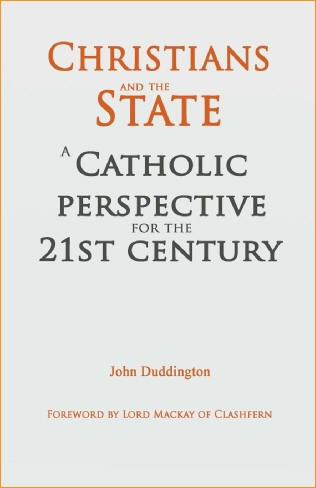Book Review
Christians And The State :
A Catholic Perspective For The 21st Century
by John Duddington
Gracewing
ISBN: 978 085244 829 8
 Ought Christianity provide a contribution to
the current political debate? Or ought it be limited to the private
sphere, as certain secularists would wish? The author of this wonderfully
readable work cogently argues in favour of the former. In the Catholic
tradition, objective moral norms are accessible to reason and hence the
role of religion is not to supply these norms but to shed light on the
application of reason to their discovery.
Ought Christianity provide a contribution to
the current political debate? Or ought it be limited to the private
sphere, as certain secularists would wish? The author of this wonderfully
readable work cogently argues in favour of the former. In the Catholic
tradition, objective moral norms are accessible to reason and hence the
role of religion is not to supply these norms but to shed light on the
application of reason to their discovery.
The author notes that according to natural law reasoning, when the state passes laws that offend against the basic principles of justice, it is no law at all. Natural law is different from the laws of nature and, because it is rooted in reason, it is not limited to the Catholic tradition. As the Baptist David McIlroy says: "Natural law's fundamental philosophical claim is that there is an objective moral order, that human beings are not free, on all issues, to construct whatever morality they think fit but are instead constrained by the ordering of nature." From this, it is clear that the principle of autonomy is not an absolute one.
The author writes that the notion of natural law as "having an objective reality which does not change in tune with changing political, social and economic circumstances is vital." Thus even if a majority at a given time choose to vote in favour of slavery or abortion, for example, this does not make these things right.
The basic idea behind natural law was expressed by Thomas Aquinas as "Good is to be done and pursued, and evil is to be avoided." From a medical perspective, euthanasia, abortion and such things ought not be carried out because they are intrinsically evil acts. In contrast, obedience to the natural law leads to human flourishing. Further developments of the natural law theory include the principle of human dignity and that of the common good. There is a certain irony involved when "dignity", for example, is used in promoting euthanasia.
Christians have good reason to say that natural rights derive from natural law. As David McIlroy puts it: "natural law theory...turns out to be a sort of human rights theory: a theory that there is an objective moral order of right and wrong which determines how human beings ought to be treated and that governments should be held accountable when they violate that objective moral order."
The chapter on conscience and law is particularly good. It begins with the now famous Glasgow midwives case and it then asks what we mean by conscience. According to Pope Benedict XVI, conscience is so frequently confused these days with the prevailing opinions of the day. How easy it is to forget that these opinions are shaped by an increasingly secularist media. Cardinal Pell is surely right not to favour the phrase "primacy of conscience". The author then examines how UK law deals with claims based on conscientious objection and ends the chapter by his own very sensible way forward.
The chapter on the state and morality examines the famous Hart-Devlin debate: is there a distinction between private and public acts? With Lord Devlin, the author regards some shared morality as essential to any society. In this light the issue of euthanasia is examined. A quote from Pope John Paul is followed by the observation that we do not impose our faith on others when we reject euthanasia as our arguments are grounded on reason.
This work is really valuable to those in health care and to anyone interested in medical ethics.
Reviewed by Dr Pravin Thevathasan
